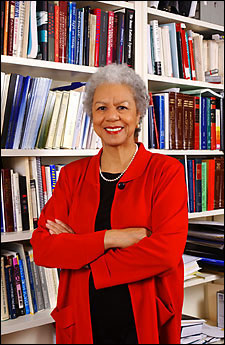Patricia King to join Harvard Corporation
Has served on Georgetown faculty for more than three decades
Patricia A. King, the Carmack Waterhouse Professor of Law, Medicine, Ethics and Public Policy at Georgetown Law Center, has been elected to become the newest member of the Harvard Corporation, the University announced Sunday (Dec. 4).

A 1969 alumna of Harvard Law School who has served on the Georgetown faculty for more than three decades, King is a noted expert in legal and ethical aspects of biomedical science, with broad experience at the intersection of scholarship and public policy. Her extensive service as a nonprofit trustee includes her recently concluded five-year tenure as chair of the board of trustees of her undergraduate alma mater, Wheaton College (Norton, Mass.), as well as leadership roles in major foundations.
“Pat King is a person of extraordinarily broad intellectual and professional interests, deep understanding of higher education, demonstrated good judgment and skill as a trustee, and abundant experience in bridging the worlds of academia and public policy, as well as the domains of law, science, and ethics,” said James R. Houghton, senior fellow of the Harvard Corporation and chair of the search committee. “Harvard as a whole, and the Corporation in particular, will be fortunate to have the benefit of her wisdom and perspective.”
“I am deeply honored to have been selected to share responsibility for governing one of the world’s foremost educational institutions,” said King. “The extremely difficult challenges facing the nation and the world over the coming decades will require substantial efforts and contributions by our institutions of higher education. Harvard, leading by example, can help show the way to developing the wisest, ablest, and most diverse group of leaders our society has ever had to deploy. Harvard’s strong, sustained, and innovative commitment to excellence and inclusiveness will be a central part of this effort. I am delighted at the prospect of working with my new colleagues on these challenges.”
“Patricia King’s wide-ranging expertise and experience promise to contribute a great deal to the work of the Corporation,” said President Lawrence H. Summers. “As a distinguished academic and lawyer deeply interested in science and ethics, and as an accomplished member of various boards and committees concerned with issues of research, education, and policy, she will add a valuable perspective to the governance of the University. I very much look forward to the opportunity to work with her.”
King joined the Georgetown law faculty in 1974, and has also served since 1990 as an adjunct professor in the Department of Health Policy and Management of the Bloomberg School of Public Health at Johns Hopkins University. In addition, she holds appointments as a faculty affiliate of Georgetown’s Kennedy Institute of Ethics and as a fellow of the Hastings Center, a bioethics research institute. Her scholarship and teaching range across the fields of law, medicine, ethics, and public policy, with a particular focus on ethical questions in biomedical science. Her recent publications address such topics as race and bioethics, ethical and policy dimensions of stem cell research, and the ethics of experimentation involving human subjects, and she is co-author of the legal casebook “Law, Science and Medicine.”
A trustee of Wheaton College since 1989, she chaired Wheaton’s board from 2000 to 2005. She is the current vice chair of the Henry J. Kaiser Family Foundation, which focuses on health care issues, and she previously served as vice chair of the Russell Sage Foundation, a leading organization in social science research, where she was a trustee from 1981 to 1991. She is a member of both the American Law Institute and the Institute of Medicine, on whose Council she served from 1998 to 2001, and she is a past member of the advisory committee to the director of the National Institutes of Health (1990-94). She served on the Committee to Visit Harvard Law School from 1975 to 1981.
A frequently sought-after expert on questions of ethics and public policy posed by developments in science and technology, King has served over the years on numerous national advisory bodies formed to address such issues. They have included, among others, the Institute of Medicine (IOM) Committee on Assessing the System for Protecting Human Research Subjects (2001-02), the National Research Council (NRC)/IOM Committee on Biological and Biomedical Application of Stem Cells (2001), the President’s Advisory Committee on Human Radiation Experiments (1994-95), the National Institutes of Health’s Embryo Research Panel (co-chair for policy, 1994), the Ethics, Legal and Social Issues Working Group of the NIH’s Human Genome Center (1989-95), the NIH’s Recombinant DNA Advisory Committee (1979-81), and the National Commission for the Protection of Human Subjects of Biomedical and Behavioral Research (1974-78), which produced the seminal “Belmont Report.” In addition, she chaired the NRC/IOM Committee on the Assessment of Family Violence Interventions (1994-98).
Early in her career, King was a lawyer in the federal government, serving as special assistant to the chair of the Equal Employment Opportunity Commission (1969-71), deputy director of the Office of Civil Rights of the Department of Health, Education, and Welfare (1971-74), and deputy assistant attorney general in the Civil Division of the Department of Justice (1980-81).
King and her husband, Roger Wilkins, the Clarence J. Robinson Professor of History and American Culture at George Mason University, have a grown daughter, Elizabeth, and live in Washington, D.C.
King will officially take up her duties around May 1, 2006. She will succeed Conrad K. Harper, who stepped down from the Corporation last summer.
The seven-member Harvard Corporation, formally known as the President and Fellows of Harvard College, is Harvard’s executive governing board and the smaller of Harvard’s two boards, the other being the thirty-member Board of Overseers. In accordance with Harvard’s charter, the Corporation on Sunday elected King as a Fellow of Harvard College, with the consent of the Board of Overseers.




